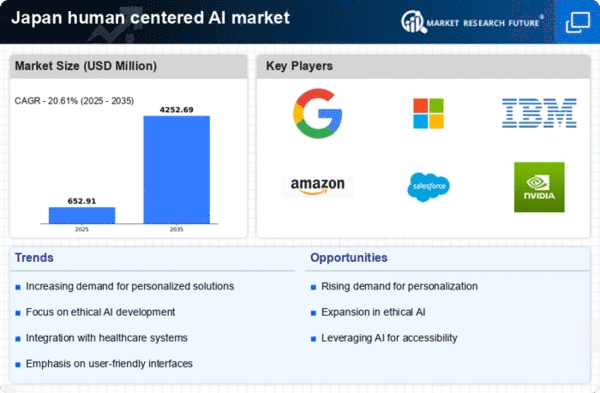Integration of AI in Education
The integration of human centered-ai technologies in the education sector is emerging as a pivotal driver for market growth in Japan. Educational institutions are increasingly adopting AI tools to personalize learning experiences and improve student engagement. For instance, AI-driven platforms can analyze student performance data to tailor educational content, thereby enhancing learning outcomes. The market for AI in education is anticipated to grow by about 15% annually, reflecting a shift towards more adaptive learning environments. This trend not only benefits students but also positions the human centered-ai market as a vital contributor to the future of education in Japan.
Focus on Workforce Augmentation
In Japan, there is a growing emphasis on workforce augmentation through human centered-ai technologies. As the population ages and labor shortages become more pronounced, businesses are increasingly turning to AI solutions to enhance productivity and efficiency. Human centered-ai applications are being utilized to assist employees in decision-making processes, thereby improving overall performance. The market for AI-driven workforce solutions is expected to grow by around 30% in the next few years, as organizations seek to leverage technology to complement human capabilities. This trend not only addresses labor challenges but also positions the human centered-ai market as a critical component in the future of work.
Government Initiatives and Support
The Japanese government is actively promoting the development and integration of human centered-ai technologies, recognizing their potential to enhance productivity and innovation. Initiatives such as funding for research and development, as well as partnerships with private sectors, are fostering an environment conducive to growth in the human centered-ai market. In 2025, the government allocated approximately ¥100 billion to support AI-related projects, indicating a strong commitment to advancing this technology. Such support not only encourages local startups but also attracts foreign investments, thereby expanding the market landscape and driving advancements in human centered-ai applications across various industries.
Rising Demand for Personalized Services
The human centered-ai market in Japan is experiencing a notable surge in demand for personalized services across various sectors. This trend is driven by consumers' increasing expectations for tailored experiences, particularly in retail and customer service. Companies are leveraging human centered-ai technologies to analyze consumer behavior and preferences, enabling them to offer customized solutions. For instance, the market for personalized AI-driven recommendations is projected to grow by approximately 25% annually, reflecting a shift towards more individualized interactions. As businesses recognize the value of enhancing customer satisfaction through personalization, investments in human centered-ai solutions are likely to escalate, further propelling the market's growth.
Advancements in Natural Language Processing
Recent advancements in natural language processing (NLP) are significantly impacting the human centered-ai market in Japan. Enhanced NLP capabilities enable machines to understand and respond to human language more effectively, facilitating smoother interactions between users and AI systems. This is particularly relevant in sectors such as customer service and education, where communication is paramount. The market for NLP technologies is projected to grow by approximately 20% annually, driven by the increasing adoption of chatbots and virtual assistants. As organizations continue to integrate these technologies, the human centered-ai market is likely to expand, offering innovative solutions that enhance user experience.
















